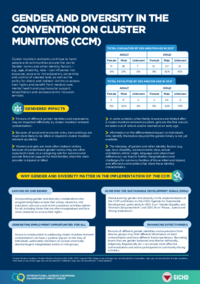Cluster munition remnants continue to harm people and communities around the world. Though they are indiscriminate weapons, their impact and consequences are different based on a person’s gender identity and expression, and on how these intersect with other identity factors such as age, disability, language, and race. Conscious of this, States Parties to the Convention on Cluster Munitions have long recognised the importance of ensuring that all decision-making processes and interventions are sensitive to gender identity and the diversity of populations. This commitment was further reinforced at the Second Review Conference in 2021 through the adoption of the Lausanne Action Plan, which includes specific actions and related indicators to strengthen gender and diversity mainstreaming at all levels.
The GICHD, together with UNIDIR and the International Gender Champions Disarmament Impact Group, developed a factsheet to provide an overview of the differentiated impact of cluster munition remnants, report progress on the incorporation of gender and diversity considerations in the Convention’s framework, and support States Parties and stakeholders in their mainstreaming efforts.
Categories: International Conventions, Gender, Diversity and Inclusion, Explosive Ordnance Risk Education (EORE)

